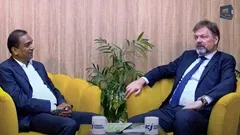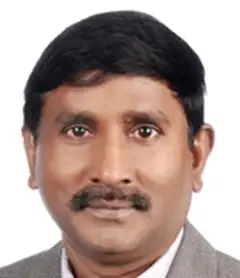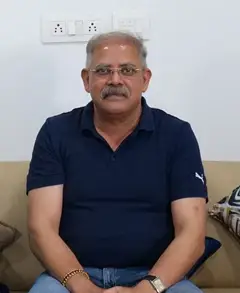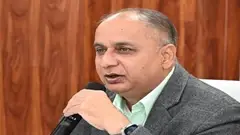
Krishi Jagran team interacted with Mayank Tiwari, the Founder and CEO of ReshaMandi- India’s first and largest farm-to-retail digital ecosystem for the natural fibre supply chain.
During the pandemic, ReshaMandi started working on silk and gradually evolved into being a digital ecosystem for the natural fibre supply chain. How has the journey been and what are the initiatives that you have undertaken especially for farmers, weavers and reelers?
Established in May 2020, ReshaMandi is India’s first and largest farm-to-retail digital ecosystem for the natural fibre supply chain. The Indian textile industry is 3000 years old and ever since its inception, has not witnessed any disruptions or developments. The industry has a tremendous scope that needed tech interventions for grassroots-level enablement. The concept of ReshaMandi is unique and has never been tried before. The inspiration for ReshaMandi first occurred to me in early 2020 when I was wondering how I could help promote one of India’s most treasured legacies – the silk industry.
India is the world’s second-largest producer of silk, second only to China and even though silk is in short supply in India, demand exceeds supply. The current gap between supply and demand is being filled by imports, indicating both challenges and vast potential for improvement in the sector. We have recently added other natural fibres such as cotton, coir, jute and banana to our portfolio. The natural fibre industry as an entity in itself provides livelihood to numerous farmers, artisans and weavers. Today, we work with farmers (41,000+), weavers (7000+), reelers (5500+) and retailers (3300+) in the entire natural fibre supply chain to improve their productivity, impact their bottom line and eventually be instrumental in improving the quality of their lives.
Tell us about the ReshaMandi app? With the high-end technology being used by ReshaMandi, how do the non-tech-savvy community use this?
The ReshaMandi Super app connects different stakeholders across the supply chain. The platform is a single-stop solution providing linkages across verticals as well as integrations with fintech partners and marketplaces.
For stakeholders, the app offers insights across the value chain. These include updates on weather and soil quality and how it could impact cocoons, market linkages of both input procurement (cocoon) and selling output (yarns), maintaining ledgers, information on best practices and purchasing machine tools, etc., for weavers. We also have a huge network of Procurement Centres around the country where farmers can get in touch with our representatives, either through a phone call or by physically visiting the centre with a prior appointment. Farmers have the option to pick up inputs directly or order through the app with the representative’s help. We have the flexibility to book an appointment with them to collect the cocoons from the farmer’s house to avoid a long journey to the mandis. The app is available in five regional languages – Hindi, Kannada, Tamil, Telugu and Marathi – apart from English, which provides farmers in regional areas access to the app with ease.
You have managed to disrupt the entire supply chain & established successful partnerships in India? What will be new in terms of technology advancement and enablement at the grassroots level?
ReshaMandi is a technology-driven platform wherein our IoT devices help farmers analyse the rearing process and identify the best irrigation practices for their yield. Timely access to quality eggs and powder disinfectants on our app ensures that the farmers are not losing out on revenue. Providing the right inputs to farmers itself has improved productivity by 20% and reduced crop failures by 10%. The technological advancements that we have are:
-
Farm IoT for MoriCulture for soil analysis concerning moisture and carbon content affecting cocoon production. RM App for alerting and advisories to farmers.
-
ReshaSaathi Rearing Centre IoT for Temperature, humidity, light and air quality analytics and advisories via RM Mobile App.
-
Rearing centre automation clubbed with ReshaSaathi, Wi-Fi plugs and automation devices for zero-touch quality produce.
-
AI/ML atop computer vision for non-destructive classification, grading and assessment of cocoon quality.
-
Macro advisories based on environmental conditions and common recommendations from the scientific community are dispersed using the ReshaMandi mobile app to farmers.
-
Integrations with fintech players to provide one-click loan disbursals via RM mobile app.
-
One-stop regional digital platform in the form of an RM mobile app for farmers to stay updated on what’s happening in the silk industry, macro advisories, khata, market linkages, community, etc.
These technological interventions have helped to get rid of the Agro block faced by farmers. To elaborate, technological interventions have helped 5,500 farmers across Karnataka in our network, increased their income by almost 30% and ensured steady profits from the market.
Silk industry being a highly unregulated industry, what challenges did you face in your endeavours and how are you creating or propelling change in this unorganised sector?
The industry saw a fluctuation in the demand, quality, change in methods of farming and much more. ReshaMandi’s technological interventions have revolutionised the natural fibre supply chain since its start, which has helped them regulate the unorganized segment.
ReshaMandi has brought together stakeholders of the natural fibre ecosystem – farmers, weavers, reelers and retailers-by working at the grassroots level. Typically, farmers are exploited and underpaid on the pretext of the inferior quality of their cocoons. This is largely due to a lack of understanding about the market value of their produce. Through ReshaMandi, we are striving to mitigate this problem by educating farmers with the latest tech solutions such as an AI-led cocoon grading technology. This is an adaptation of the world-renowned Renditta test that can grade the quality of cocoons by using computer vision and data analytics.
One of the key challenges we faced was the language barrier. Farmers were open to understanding the concept and quite receptive to our ideas and technology. Therefore, besides English, we decided to make ReshaMandi’s application available in regional languages such as Kannada, Marathi and Hindi for the farmer’s convenience and benefit.
India relies heavily on the imports of natural fibres, do you think India can compete with countries like China?
China and India together account for about 90% of total natural fibre production. To promote the Indian market, we need to improve the quality and productivity of natural fibres. As productivity increases with technological interventions, the Indian markets would be able to match the demand and supply, whereby imports from China can be reduced.
What is the future roadmap for ReshaMandi? Can you help me put numbers to the growth seen by your company from its inception?
ReshaMandi is a growing company. Within a short span of two years, we have built a strong network and created an impact at the ground level by improving the quality of life of our stakeholders while also boosting productivity.
We are open to partnering with the right set of people/organizations aligned with our vision of creating an impact. We keep working continuously for bringing farmers, weavers, reelers and retailers within our network. Accordingly, we have plans to strengthen our tech stack and attract the right talent that will help in growing the business.
How closely do you work with the Government and Industry bodies considering the nature of services that you offer? How have government policies helped the companies from the silk sector?
Recent developments in the silk sector’s policies have helped companies immensely. Programmes such as the Integrated Scheme for Development of Silk Industry and the North-East Region Textile Promotion Scheme have helped the sericulture industry in improving the production, quality and productivity of silk cocoons.
Government initiatives such as the Integrated Sericulture Development Project and Intensive Bivoltine Sericulture Development Project are aimed at the holistic development of sericulture in all its spheres from plantation development to the production of fabrics with value addition at every stage of the production chain, helping companies procure higher and better yield from farmers.
Common problems faced by sericulture farmers are similar to the issues faced by the Indian silk industry. These include price fluctuation, absence of a proper market, lack of transport and storage facilities, poor information on market trends, absence of finance, high cost of production and low productivity, dearth of technology penetration, rural nature of the industry and competition from synthetic fibres, etc.
Today, there are several initiatives taken by the government to curb these issues such as introducing a platform wherein farmers can obtain a proper price for their yield, the introduction of high-yielding mulberry varieties, adoption of clusters of villages for better marketing conditions etc., to name a few.
India ranks second in the production and acreage of sericulture in the world. While we have the potential to become number one, there are still some areas for improvement. Some challenges we may look at addressing include skill upgradation, the evolution of appropriate cost-effective technologies and the establishment of close linkage between forward and backward sub-systems for greater efficiency and synergy as the sericulture and silk industry is highly scattered and unorganized.
Also, the Central Silk Board is a supporter, facilitating changes in the sericulture supply chain industry.
Do you sense any kind of change in investment sentiment among VCs? What are your investment plans?
It is important to understand that a business has to show sustained revenue/profitability and adhere to good governance. If the foundation of a business is strong, whether it’s a start-up or a traditional business, it will not face any challenge in raising capital or getting the right partners on board.















Share your comments